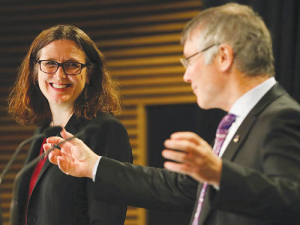New Order
OPINION: If old Winston Peters thinks building trade relations with new nations, such as India, isn't a necessary investment in our future, he has rocks in his head.
 EU Trade Commissioner Cecilia Malmstrom and NZ Trade Minister David Parker address the media following the beginning of negotiations on a free trade deal between NZ and the EU in Wellington earlier this month. Photo: Alphapix / John Cowpland
EU Trade Commissioner Cecilia Malmstrom and NZ Trade Minister David Parker address the media following the beginning of negotiations on a free trade deal between NZ and the EU in Wellington earlier this month. Photo: Alphapix / John Cowpland
A 50% increase in trade, higher wages for New Zealanders and cuts in tariffs to benefit our producers.
These and other options were floated when the European Union’s Trade Commissioner, Cecilia Malmstrom, and NZ Trade Minister David Parker met in Wellington last week to formally start negotiations for a free trade agreement (FTA).
They and their respective officials met briefly at Parliament to start the talks, a long time in the making. They come as NZ’s traditional ally in the EU, Britain, works on its (messy) exit from the EU.
Both Malmstrom and Parker expressed delight that the talks are underway and waxed lyrical about what an FTA could do for both parties. Their chemistry seemed good and Malmstrom appeared relaxed and genuinely friendly towards NZ; and the officials negotiating the deal know each other well.
No surprises are expected in these talks, but there will be challenges. Two-way trade between the EU and NZ is worth $16 billion and the talk was of a natural partnership and historic values shared by both jurisdictions.
Parker says a successful FTA will raise the prosperity of both NZ and EU, with benefits for all.
“We are interested in trade that benefits all and we are determined to push the benefits of those down to small businesses by reducing their barriers to trade. We also want to encourage more women-owned businesses into trade and encourage our burgeoning indigenous economy to grow,” he says.
Malmstrom described the talks as opening a new chapter in economic possibilities for companies and giving choices to consumers, as well also deepening the strategic ties.
She says NZ is a friend and an ally and that it, along with the EU, stood for common values as expressed in sustainable trade and done in compliance with international trade rules.
“We already do trade with each other, but we will try and facilitate that even further and build this relationship; so as to create more jobs and widen consumer choice.
“We have the opportunities to set ambitious rules to facilitate trade. Trade is about tariffs but also [requires] dealing with obstacles, red-tape, bureaucracy, difficult procedures to get certificates and licences.”
Malmstrom says she’s looking forward to the discussions and thinks if the negotiations are successful it will produce a blueprint for FTAs that will inspire other nations to do the same.
Parker agrees, saying that a good NZ/EU FTA would not only benefit both jurisdictions but also make the world a better place.
The first detailed round of negotiations is due to take place in Brussels next month, followed by a further round in Wellington later in the year.
Recent weather events in the Bay of Plenty, Gisborne/Tairawhiti, and Canterbury have been declared a medium-scale adverse event.
DairyNZ's chief executive Campbell Parker says the 2024/25 dairy season reinforces the importance of the dairy sector to New Zealand.
A New Zealand agribusiness helping to turn a long-standing animal welfare and waste issue into a high-value protein stream has won the Australian dairy sector's top innovator award.
OPINION: A bumper season all around.
Dairy Women's Network (DWN) has announced that Taranaki dairy farmer Nicola Bryant will join its Trust Board as an Associate Trustee.
Rural Women New Zealand (RWNZ) says it welcomes the release of a new report into pay equity.

OPINION: A mate of yours truly reckons rural Manawatu families are the latest to suffer under what he calls the…
OPINION: If old Winston Peters thinks building trade relations with new nations, such as India, isn't a necessary investment in…